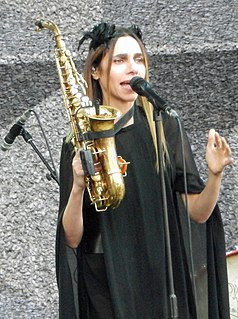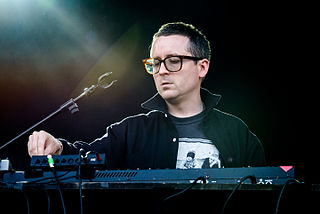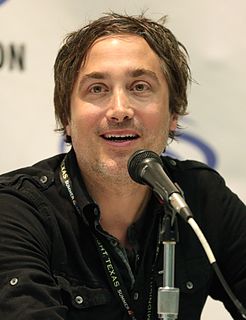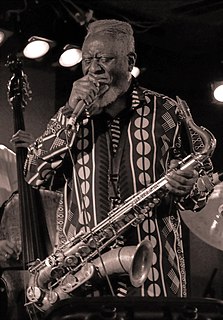A Quote by P. J. Harvey
I work on words quite separately to music. They're both ongoing, and I don't ever feel like I'm working in a cycle in that respect, because it's every day anyway, no matter what I'm doing. Then I get to a point when I've collected together enough words that seem like they want to be songs rather than poems, or sometimes not.
Related Quotes
If you want to be good at anything, you have to work hard at it. It doesn't just fall from the sky. I work every day at trying to improve my writing, and I really enjoy it. Nothing fascinates me more than putting words together, and seeing how a collection of words can produce quite a profound effect.
I'm quite interested in what words can be, if it's very few words, and it's a kind of club track but it has a sort of uplifting or spiritual kind of feeling to it. Somehow, something bigger than just the words on the page happens when you hear it all together. Sometimes I notice when I'm DJing, I put on a lot of tracks that feature vocals. I guess for me, it's just from growing up loving songs, so maybe I'm geared slightly more towards dance music that features a song element.
I'd love to work on something that gets some type of critical respect. This business is sometimes so brutal - you work on something for months and really feel like the project is good and you're doing the best work you can, and then it just gets hammered by critics. It's such a bummer sometimes, because everything seems to build up to the release and a couple of bad reviews can make it seem like it was all a waste, which you know it wasn't.
Some professional writers write everyday no matter what and perhaps that's the way it should be done, but it's not the way I do it. If I'm not pregnant with words and I'm not in labor with them, I don't even try to bring them forth because they won't be any good anyway. Once I'm ready to deliver, it's like being pregnant. I've got to find a typewriter or a piece of paper. The only words that have ever had any possible value to others seem to have been those words that just had to come out.
It is important to go into work you would like to do. Then it doesn't seem like work. You sometimes feel it's almost too good to be true that someone will pay you for enjoying yourself. I've been very fortunate that my work led to useful drugs for a variety of serious illnesses. The thrill of seeing people get well who might otherwise have died of diseases like leukemia, kidney failure, and herpes virus encephalitis cannot be described in words.
Much of an editor's job is in fact pretty nanny-like in nature: in many ways, you're there to protect and defend, to reassure and clean up. What I ask from writers is respect. I want them to respect me enough to turn in a clean draft. I want that draft to be as good as they can make it. I want to feel the thought behind those words. And I want it to be turned in on time. It drives me wild when I get a story that's obviously slapped together, and the same can be said for a manuscript; you should respect your reader enough to give her something that reflects your best efforts.
A good mixtape didn't just gather together a bunch of love songs, but instead created an emotional narrative specific to your affection. The stories in most of my favorite collections are collected more like songs on a mixtape than, say, collected like spare change. By which I mean they are in conversation with each other and work to become larger than their parts.
There are moments on songs like "Violet" where it's still shrouded in metaphor, but it's quite, I don't know, explicit. And then there are songs like "Boyfriend," where obviously it's straight up, very, very simple. It's fun to play around with words; I really enjoy doing that, so I don't think I'll ever stop, but it's also been nice to have messages on there that I can say flat out and that people appreciate.
I've been getting publishing royalties and stuff like that. I have just been lucky. They come in at the right time. Sometimes they don't, but I am not wealthy or anything like that. I just love to work. I would rather work three hundred and something days out of the year. I would rather be working. They don't know. I love playing. Then I can really get my music together.
What does it mean to be a used white wife, a mother, a tragic girl writing poems? Sandra Simonds gets into these messy words and then tears them apart. Sometimes with the words of others. And sometimes with poems made from scratch. They aren't all bad, these words. But they aren't all good either. And that is where Mother was a Tragic Girl gets its power. You will at moments be laughing but then you will also at moments just as much be crying. If Antigone was alive and decided to write some poems about the nuclear family, she would write them like Sandra Simonds. These are tough.



































